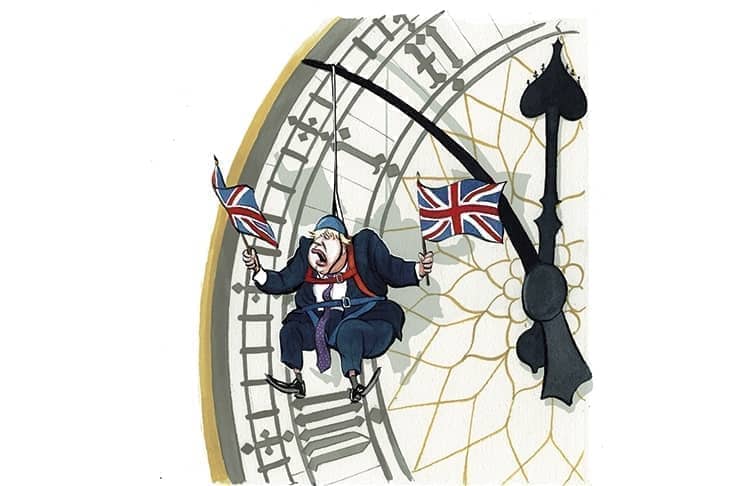Boris Johnson is taking one heck of a risk by making labour shortages a deliberate part of his economic strategy. That, at least, is the conventional wisdom about the Prime Minister in the wake of party conference season.
If things go well, then businesses will raise productivity by investing heavily in new machinery and more training for home-grown workers who currently lack key skills. And then all will be fine for Johnson. But if things go badly, labour shortages will merely fuel rampant inflation, while gaps on shop shelves will become endemic. Key groups of voters will turn on the PM, hastening his demise.
I might have found this line of thinking persuasive myself had I not been a guest on Jeremy Vine’s morning television programme on Channel 5 after Johnson’s keynote speech last week.
During the phone-in section, two gentlemen in succession who defined themselves as ‘working class’ rang in to talk about it. The PM’s argument about no longer pulling the lever marked ‘uncontrolled immigration’ had connected with them more powerfully than any economic message I can recall in 30 years of writing about politics.
Starmer’s readiness to pull the migration lever to the tune of 100,000 new visas for overseas HGV drivers has not gone unnoticed
That a prime minister had finally registered the depressing impact upon their living standards of being undercut by cheap foreign labour – and decided to make stopping that phenomenon a central part of economic policy – had induced a state of near-religious devotion to him in them. Keir Starmer’s readiness, by contrast, to pull the migration lever again to the tune of 100,000 new visas for overseas HGV drivers had also not gone unnoticed.
That’s when it struck me that it doesn’t really matter whether the PM’s new approach is seen to have ‘worked’ by the time of the next election in terms of conventional economic metrics. If these two callers were at all representative of the mood among middle-aged working-class people then it was already game over for Starmer.
Because Johnson had just succeeded in turning economic policy into a cultural totem, to be judged not in terms of dry measures such as overall GDP growth but according to ‘who understands people like me?’ and ‘who is on my side?’.
It may well be a brilliant piece of opportunism by Boris to talk up such a rationale about the unexpectedly severe worker shortages being encountered by several economic sectors. But whatever the motivation, the replication by the Prime Minister of a world view shared among so many working-class people in pub saloon bars, in bingo halls and elsewhere in ‘left behind’ towns for so long should be understood as a very important new feature of the political battleground.
Johnson has succeeded in adding an extra and readily understandable dimension to his overall ‘levelling-up’ agenda; one that works on a personal level rather than merely in terms of how overall community life can be visibly improved.
Are Keir Starmer and Labour going to have a cat in hell’s chance of winning back Hartlepool, or Leigh, or Wrexham or any number of other Red Wall towns while they are so wedded to the idea of continuing with the mass importation of workers? That is extremely hard to envisage. In pinning himself to such an outlandish number as regards visas for HGV drivers, Starmer has just given Johnson oceans of the fabled ‘clear blue water’ on an issue where the PM’s instincts are in line with those of key groups of voters in battleground seats.
The economic results will have to be truly catastrophic to persuade Johnson’s new devotees that they – and he – have called it wrong; that, in fact, as Tony Blair once argued, even questioning the merits of untrammelled globalisation is a waste of time, akin to debating ‘whether autumn should follow summer’.
‘The character of this changing world is indifferent to tradition, unforgiving of frailty, no respecter of past reputations. It has no custom and practice. It is replete with opportunities, but they only go to those swift to adapt, slow to complain, open, willing and able to change,’ Blair told his Labour conference audience back in 2005. Presumably such thinking was what persuaded him to throw open the British jobs market to the populations of the A8 EU accession countries without even bothering to impose proper controls.
Johnson has now anchored within the Tory electoral coalition those who are not indifferent to tradition, do respect custom and practice and are not necessarily either swift to adapt or slow to complain about change. Normal, non career-obsessed human beings, in other words.
What’s more, Boris has, in Rishi Sunak, a Chancellor who is able to reassure other more middle-class parts of the Tory voting base that there will be no descent into a fortress economy or ugly nativism in general. I’d say that so long as he holds his nerve and sticks to his newly-outlined approach he will stay on course for an even bigger win at the next election than the one he secured in 2019.







Comments